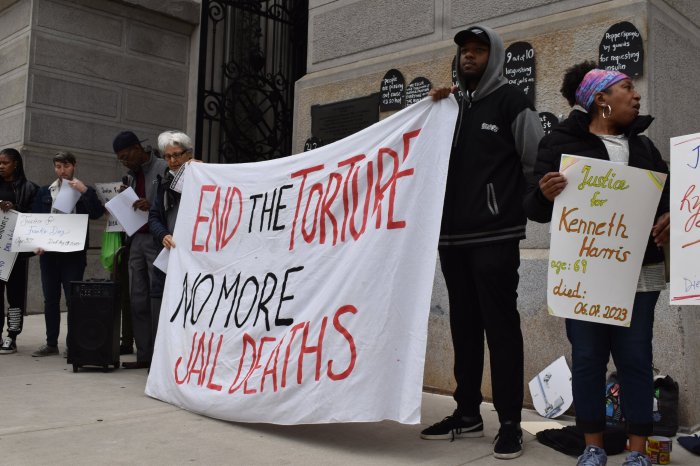A federal judge, after holding the city in contempt of court, ordered Mayor Cherelle Parker’s administration to set aside $25 million to improve conditions within the Philadelphia jail system.
The mandate, issued Friday, Aug. 16, includes more than 20 stipulations, many with deadlines. Among the provisions are directives to examine the increased use of civilian employees and the possibility of transferring inmates to alternative facilities.
U.S. District Court Judge Gerald McHugh said the measures were crafted in consultation with a court monitoring team that has been overseeing the Philadelphia Department of Prisons as part of a 2022 settlement.
The settlement agreement stems from a class-action lawsuit filed on behalf of incarcerated people at the height of the coronavirus pandemic alleging inhumane conditions inside the jails.
McHugh decided to hold the city in contempt last month for not meeting the conditions of the settlement, particularly benchmarks related to staffing and minimum amounts of out-of-cell time for inmates.
In recent years, the PDP has been plagued by a profound staffing crisis, multiple escapes and violence, among other issues.
In 2023, the department’s security staffing decreased by 8% while the inmate population grew 7%, according to the most recent court monitor’s report. As of March, more than 800 correctional officer positions were unfilled, equating to a vacancy rate of nearly 50%.

“We’re disappointed in the finding of contempt, but have the utmost respect for Judge McHugh and his judgment in crafting this order,” Prisons Commissioner Michel Resnick said in a statement.
Resnick, who Parker selected to lead the department in April, added that he hopes the requirements will “provide the system with the tools needed to achieve compliance by removing barriers to our efforts to recruit, hire and retain staff in order to provide the inmate population with services on a consistent basis.”
The legal team representing the incarcerated population had asked McHugh to assess a daily fine of $5 an inmate for not meeting the terms of the settlement. Such an arrangement would have generated nearly $25,000 a day, and the attorneys argued the funding should be distributed to inmates upon their release.
“Conditions in the Philadelphia jails are really horrible, and I think this order is a recognition of that,” said Matthew Feldman, supervising attorney for the Pennsylvania Institutional Law Project, which is part of the legal team representing inmates in the case. “The $25 million figure is very striking and shows how serious the court is taking this and shows how serious the problem really is.”
Feldman told Metro that he and his colleagues will seek compensation for incarcerated individuals if conditions do not significantly improve as a result of the ruling.
McHugh is requiring the Parker administration to pay $25 million into a restricted account that can only be accessed to meet the stipulations included his order. The judge barred the city from reducing PDP’s budget for the current or future years to recoup the money.
The amount is roughly the total the city has saved on PDP’s budget in recent years – mainly due to unspent salaries and benefits as a result of the staffing shortage, according to court documents.
Resnick, under one mandated directive, must “explore realistic, suitable options” for the relocation of inmates to another secure facility and file a report with his findings within four months, the order says.
To address vacancies, the PDP is being required to contract with an outside recruiting firm and study the potential of using civilian employees in some roles currently occupied by armed correctional officers.
A requirement that candidates live in Philadelphia has already been scrapped, but McHugh wants the city to open hiring to those living outside of Pennsylvania as well.
Additionally, the order mandates that, within six months, the city sets up and funds an “Access to Care team” to ensure prisoners receive adequate and timely medical treatment.
City and PDP staff will also be tasked with gathering data on inmates without detainers who are behind bars only because of their inability to post bail. The vast majority of the incarcerated population at the State Road jails are being held pre-trial.
Specifically, McHugh directs the city to collect information about inmates locked up on less than $100,000 bail, those with serious medical needs, and individuals with misdemeanor or minor felony charges, among other parameters.
The unstated implication is that inmates in those categories could be made eligible for release to reduce the strain on the undermanned prisons.

City attorneys, in court filings opposing the contempt motion, noted that other entities, such as the District Attorney’s Office and judicial leaders, play a role in prison population trends and the length of time pre-trial detainees remain behind bars.
Another argument they advanced is that Parker and Resnick need time to implement changes to improve the PDP.
Court-appointed monitor Cathleen Beltz, in a March report, wrote that the city has not acted urgently enough, instead opting for “a course of half measures steeped in bureaucratic and political rigidity.”
Referring to that statement, Parker’s legal team said in court documents that, while that characterization may have been true in the prior mayoral administration, it is “inapplicable to the energy, investment, and support” now flowing to the PDP.
“It would have been irresponsible for us to not seek a contempt finding here to wait and see if this new administration improves things,” Feldman said. “Our clients are suffering on a daily basis, so we had to act now.”
Beltz is scheduled to release an updated report on prison conditions Sept. 30.




























